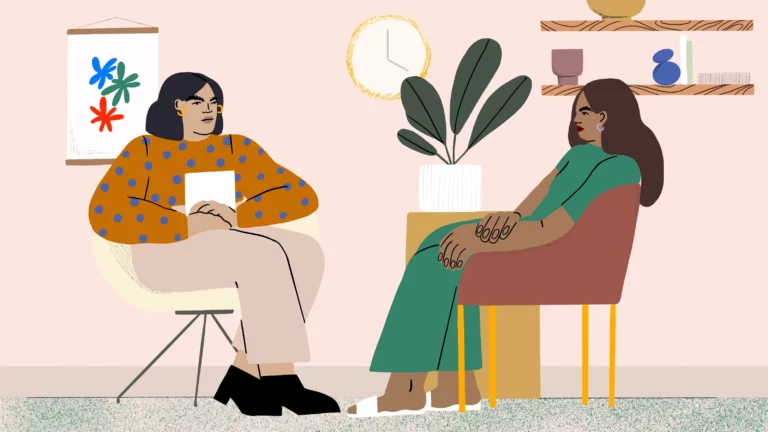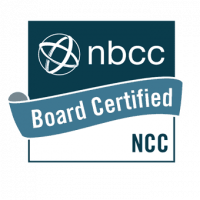Changing Your Thoughts, Changing Your Life: The 6 Powers of Cognitive Behavioral Therapy
We can Help

Schedule a free consultation with us and find out how we can help you or a loved one.
What is cognitive behavioral therapy?
Cognitive-behavioral therapy (CBT) is a form of psychological treatment that has been extensively studied and shown to be effective for a wide range of mental health conditions. CBT is a talk therapy that focuses on identifying and changing negative thought patterns and behaviors. It is based on the idea that the way we think about things influences the way we feel and behave. By changing our thoughts, we can change our emotions and behavior.
CBT is a short-term, goal-oriented therapy that typically lasts for 12-16 sessions. The therapist and client work together to identify problematic thoughts and behaviors, and develop strategies to challenge and change them. The therapist teaches the client specific skills and techniques to use in daily life to manage symptoms and improve functioning.
CBT can be used to treat a variety of mental health conditions, including anxiety disorders, depression, post-traumatic stress disorder (PTSD), borderline personality disorder, obsessive-compulsive disorder (OCD), eating disorders, and substance abuse disorders. It can also be helpful for individuals with chronic pain, insomnia, and other medical conditions.
How does CBT work?
CBT works by targeting the negative thought patterns and behaviors that contribute to psychological distress. The therapist and client work together to identify the thoughts and behaviors that are causing problems, and develop strategies to challenge and change them.
For example, a person with social anxiety may have negative thoughts such as “Everyone is judging me” or “I will embarrass myself if I speak up.” These thoughts can lead to avoidance behaviors, such as avoiding social situations altogether. The therapist may help the client to identify and challenge these thoughts, and develop strategies to gradually expose themselves to social situations in a safe and supportive way.
What are the techniques used by a CBT therapist?
- Cognitive restructuring: This involves identifying and challenging negative thoughts and replacing them with more balanced and realistic thoughts.
- Behavioral activation: This involves increasing engagement in positive activities, which can improve mood and reduce symptoms.
- Exposure therapy: This involves gradually exposing the individual to feared situations in a safe and supportive way, which can reduce anxiety and avoidance behaviors.
- Relaxation techniques: This includes techniques such as deep breathing, progressive muscle relaxation, and guided imagery, which can help to reduce physical symptoms of anxiety and stress.
- Problem-solving skills: This involves developing skills to solve problems in a more effective way, which can reduce stress and improve coping.
- Mindfulness techniques: This involves learning to be more present and non-judgmental in the moment, which can reduce stress and improve mood.
CBT has six main points that help individuals develop skills to manage their thoughts, feelings, and behaviors.
- The Power of Awareness: This power involves becoming aware of negative thoughts and beliefs and recognizing how they impact our emotions and behaviors.
- The Power of Thought: This power focuses on identifying and challenging negative thoughts and beliefs, and replacing them with more positive and realistic ones.
- The Power of Emotion: This power involves learning to manage emotions, such as anxiety or depression, through techniques such as relaxation and mindfulness.
- The Power of Behavior: This power involves developing positive behaviors, such as exercise or engaging in enjoyable activities, to improve mood and reduce symptoms.
- The Power of Belief: This power focuses on identifying and challenging negative core beliefs, such as “I am worthless,” and replacing them with more positive and realistic ones.
- The Power of Change: This power involves developing and implementing strategies to make lasting changes in thought patterns and behaviors.
What can I expect during a CBT session?
During a CBT session, the therapist and client will work collaboratively to identify problematic thoughts and behaviors, and develop strategies to challenge and change them. The therapist may use a variety of techniques, including those listed above, to help the client develop new skills and coping strategies.
CBT sessions are typically structured and focused on specific goals. The therapist will work with the client to develop a treatment plan that outlines specific goals and strategies to achieve those goals. The client may be asked to complete homework assignments between sessions to practice the skills learned in therapy.
CBT is a collaborative process, and the therapist will work with the client to develop a supportive and non-judgmental relationship. The therapist will also provide feedback and guidance throughout the therapy process.
How effective is cognitive-behavioral therapy?
CBT therapy that focuses on identifying and changing negative thought patterns and behaviors has been extensively studied and shown to be effective for a wide range of mental health conditions. Research has found it to be as effective as medication for many conditions, and may have longer-lasting effects than medication alone..
Is talk therapy as effective as behavioral therapy (CBT)?
Both talk therapy and behavioral therapy, such as CBT, can be effective treatments for a wide range of mental health conditions. However, the effectiveness of each type of therapy depends on the individual’s specific needs, preferences, and the nature of their symptoms.
Talk therapy, also known as psychodynamic therapy, is an approach that focuses on exploring unconscious or past experiences to help individuals understand the root of their symptoms. Talk therapy may involve exploring emotions, relationships, and patterns of behavior.
Behavioral therapy, such as CBT, focuses on modifying negative thought patterns and behaviors that contribute to psychological distress. It is a structured, goal-oriented approach that aims to develop specific skills and strategies to manage symptoms and improve functioning.
Research has shown that both talk therapy and behavioral therapy can be effective for treating a variety of mental health conditions, including anxiety, depression, and PTSD. However, some studies suggest that behavioral therapies, such as CBT, may be more effective for treating certain conditions, such as anxiety disorders.
Is cognitive behavioral therapy right for me?
When deciding if a type of therapy is right for you, there are several factors to consider such as your specific mental health condition, individual needs and preferences, and the severity of your symptoms. There are various types of therapy available, including those that focus on modifying negative thought patterns and behaviors.
This particular form of therapy has been shown to be effective for a wide range of mental health conditions such as anxiety disorders, depression, post-traumatic stress disorder (PTSD), obsessive-compulsive disorder (OCD), eating disorders, and substance abuse disorders. If you are experiencing any of these conditions, this type of therapy may be a suitable treatment option.
Furthermore, this type of therapy may be beneficial for those who prefer a short-term, goal-oriented approach that concentrates on acquiring specific skills and strategies to manage symptoms and improve functioning. It can be especially effective for individuals who are motivated to participate actively in the therapy process and are willing to practice the techniques learned in therapy outside of sessions.
It is essential to note that this form of therapy may not be the optimal treatment choice for everyone. Individuals with severe mental health conditions, such as schizophrenia or bipolar disorder, may require more intensive or specialized treatment. Additionally, if you experience difficulty engaging in therapy or have a history of trauma that makes exposure therapy challenging, other therapeutic options may be more suitable.
Can CBT help someone with a personality disorder?
It can be a helpful treatment for individuals with personality disorders, but its effectiveness can depend on the specific type of personality disorder and the individual’s particular needs and circumstances.
Personality disorders are a group of mental health conditions characterized by deeply ingrained and inflexible patterns of behavior, thought, and emotion that deviate significantly from cultural norms and cause problems in social, occupational, or other areas of functioning. They are typically long-standing and can be challenging to treat. CBT may focus on specific techniques such as cognitive restructuring, which involves identifying and challenging negative thought patterns, or exposure therapy, which involves gradually confronting feared situations.
However, for individuals with severe personality disorders, such as borderline personality disorder or narcissistic personality disorder, other forms of therapy, such as dialectical behavior therapy (DBT) or schema therapy, may be more effective. These therapies focus on developing skills for managing emotions and relationships, and addressing deep-seated patterns of thought and behavior.
Ultimately, the decision to pursue any form of mental health treatment should be made with the guidance of Megan Corrieri, Northstar Counseling & Therapy’s qualified mental health professional. She can assist you in determining the best course of action based on your individual needs and circumstances.
Can cognitive behavior therapy help with fibromyalgia?
Cognitive-behavioral therapy (CBT) can be helpful in managing the symptoms of fibromyalgia, a chronic pain condition characterized by widespread pain, fatigue, and other symptoms. CBT can help individuals with fibromyalgia by teaching them skills to manage the physical and emotional aspects of the condition.
What are the CBT techniques that may be helpful for individuals with fibromyalgia:
- Cognitive restructuring: This technique helps individuals identify and challenge negative thought patterns related to their pain, such as catastrophizing or focusing on worst-case scenarios. By learning to replace these thoughts with more positive and realistic ones, individuals can reduce anxiety and improve their ability to cope with pain.
- Behavioral activation: This technique involves increasing engagement in positive activities, such as exercise or hobbies, which can improve mood and reduce symptoms of fibromyalgia.
- Relaxation techniques: Techniques such as deep breathing, progressive muscle relaxation, and guided imagery can help individuals with fibromyalgia to reduce physical symptoms of anxiety and stress.
- Pain management strategies: Techniques such as pacing, which involves breaking up activities into manageable chunks, and energy conservation, which involves balancing activity and rest, can help individuals manage their pain and conserve energy.
According to a 2021 publication within the Journal of Pain Research, CBT has shown that it can be effective in reducing symptoms and improving functioning in individuals with fibromyalgia. Of the 64 individuals who received CBT in addition to medical treatment reported significant improvements in pain, fatigue, and quality of life compared to those who received medical treatment alone.
At the end of the study, the researchers found that the CBT group had significantly lower levels of pain catastrophizing and significantly higher levels of quality of life compared to the usual care group. These results suggest that CBT can be an effective treatment for reducing pain catastrophizing and improving quality of life in patients with fibromyalgia.
It is important to note that while CBT can be helpful for managing symptoms, it is not a cure for fibromyalgia. It is important to work with a healthcare provider to develop a comprehensive treatment plan that includes both medical and behavioral interventions.
Free Counseling & Therapy Consultation
If you or a loved one requires assistance but are uncertain where to commence, consider booking an online consultation with Northstar Counseling & Therapy to get started on the right course.

Megan Corrieri
Owner, Clinician, Wife & Mom
Share:










